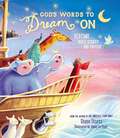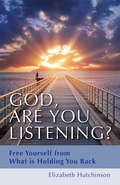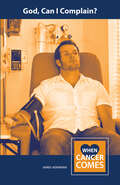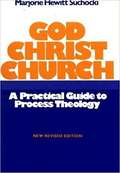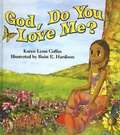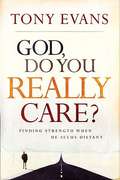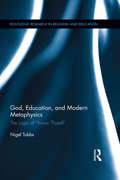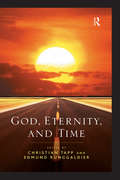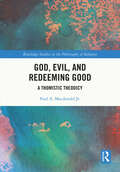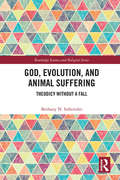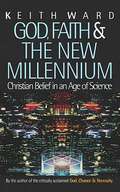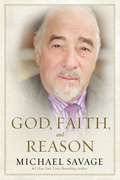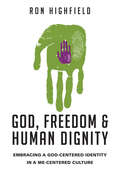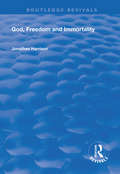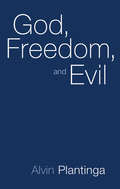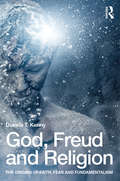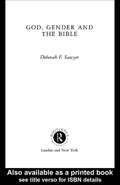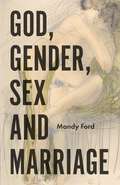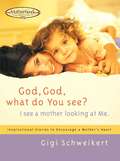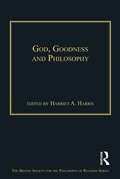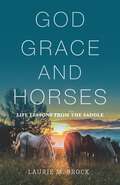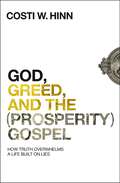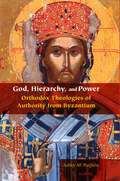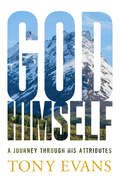- Table View
- List View
God's Words to Dream On: Bedtime Bible Stories and Prayers
by Diane M. StortzHearing Bible stories at bedtime is often a child's first introduction to spending time with God's Word—and the effects can last a lifetime. In God's Words to Dream On, bestselling author Diane Stortz and incredible illustrator Diane Le Feyer offer a vibrant combination of 52 stories and beautiful pictures with a "once upon a time" voice that stays true to God&’s powerful Word.The 52 stories take children ages 4–8 through the Bible from Genesis to Revelation in a way that helps young readers see God's plan from before Creation to sending Jesus to make the world right again. Each engaging Bible story includes:A brief Bible verseA good-night prayer related to the storyA short summary thought and bedtime blessingGod's Words to Dream On is:A great idea for establishing a good bedtime routine with your kidsAn inspiration for introducing children to the greatest book of allAn ideal gift for birthdays, baptisms, Easter, Christmas, and "I love you" presents from parents, grandparents, Sunday school teachers, and godparentsThese carefully chosen stories teach children about God&’s provision, love, and strength—the perfect truths to be in their hearts as they drift off to sleep.
God, Are You Listening?: Free Yourself from What is Holding You Back
by Elizabeth HutchinsonAre you so tired and burned out that you feel life is running you instead of you living it? Have you lost faith in yourself, in your life, and in your God? This is a nondenominational spiritual self-help book. It is intended for people of all faiths, religions, and belief systems, as well as nonbelievers. In God, Are You Listening? Elizabeth Hutchinson provides the inspiration you need to find meaning and purpose in your life. She shares her own story of how the stress and strain of her responsibilities propelled her toward a life-threatening case of burnout. She describes in accessible language the process she undertook to arrive at "heart consciousness. "Sections include: Unanswered Prayers Embracing the Gifts God Gave Us Forgiveness Blessings From Fear to Freedom Discipline Elizabeth draws on a number of techniques from psychology to spirit-centered disciplines bringing all aspects of mind, body, and spirit practice together to form a comprehensive healing path. She shares insightful stories that help build self-esteem and self-worth, she illustrates the power of word therapy, and how being in nature or listening to music can contribute to therapeutic growth. And a good deal more. At the end of each chapter, she provides exercises for further study. Elizabeth writes, "Be gentle with yourself and know that you will still have some 'bad' days. You will snap at your spouse or your children or have limited patience with the sales clerk or you may feel lonely. Old patterns are difficult to break, but the more you persist the easier it becomes. As soon as I give it over to God I find instant peace. "In God, Are You Listening?, you will find a thoughtful and encouraging teacher who will help you to find the joy, love, and peace each of us deserves.
God, Can I Complain? (When Cancer Comes)
by James AdermanWhat does the Bible say about complaining?It doesn\u2019t seem like a very Christian response to suffering—even to something as terrible as cancer—so believers sometimes think we must remain silent. Yet silent suffering can lead to bitterness toward God, guilt about the anger we feel, doubt that God is caring for us as he should, and even fear that he has abandoned us altogether.Would it surprise you that the Bible contains numerous examples of complaining believers?If you\u2019re struggling to trust in God as you or a loved one face cancer, you are not alone. Listen as Pastor James Aderman tells you the story of his struggle between bitter complaints and confident trust in God\u2019s love when the dreaded diagnosis came.Aderman found help in the story of Jeremiah, the weeping prophet. You can too.From Scripture and their own experiences, the authors of the series When Cancer Comes share words of encouragement and gospel comfort with you and your loved ones as you face cancer—with God\u2019s hope
God, Christ, Church: A Practical Guide to Process Theology
by Marjorie SuchockiThis is one of the most impressive applications of process thought to Christian doctrine and constitutes a kind of process theology mini-summa.--ADRIS Newsletter
God, Desire, and a Theology of Human Sexuality
by David H. JensenThis work of constructive theology examines human sexuality in light of Christian faith and doctrine. Jensen moves beyond the hot-button social debates about sexual orientation and sexual practices to look for healing. The seven chapters consider Scripture and sex; the connections between the triune, covenantal God and human sexuality; Christ's incarnation and resurrection as affirming the beauty of flesh; eschatology and sexual identity; the ramifications of the Lord's Supper for human sexuality; vocation and Christian callings to marriage, celibacy, and singleness; and sexual ethics.
God, Do You Love Me?
by Karen Lynn CoffeeChildren often ask the simple question, “God, do you love me?” In this book, they will discover that God shows love for us by providing all we have: wind, grass, flowers, hills, lakes, trees, birds, family, friends, church, the Bible, and more. A meaningful Scripture accompanies each answer.
God, Do You Really Care?: Finding Strength When He Seems Distant
by Tony EvansWhen the Hits Just Keep On Comin' There are small hits: The car won't start. You lose something valuable. It's raining on your five-hundred-person outdoor event. And there are big hits: She's diagnosed with cancer. You're being laid off. They're getting divorced. Regardless of magnitude, each trial causes us to ask, "Lord, do you really care?" Tony Evans bases his resounding, "Yes, He does!" on a thorough analysis of John 11. While interacting with Martha and Mary, who were reeling from news of their brother's death, Jesus' words and actions have much to say to us today. Before, during, or after you're assaulted by doubt, pain, confusion, disappointment, or grief, this powerful book will help you zero in on Christ to ensure that no crisis of any kind will ever shipwreck your faith. "I Need a Miracle. " You're in over your head. The hits just keep coming. Maybeyou could handle this if you knew God cared. But right now? Wellhellip;you're not really sure. Catastrophe, sickness, loss, and other unexpected trials and setbacks can make you doubt that God is good or wants your best. But Heisgood. And Hedoescare. Tony Evans reveals this truth in a new way through an eye-opening study of John 11. As you delve into the miracle of Jesus raising his friend Lazarus from the dead, you will find a pointed message for your own life and specific circumstances. Lingering, crippling doubts, fears, and disappointments have no rightful place in your life. Look up and take heart. God reallydoescare. More than you could begin to imagine. INSIDE LEFT FLAP "Wake up, O L ord !. . . Why do you ignore our suffering and oppression?" -Psalm 44: 23-24 Questioning God is nothing new. Since biblical times men and women have entertained doubts about His heart, His attentiveness, and His intentions. We demand answers to our cries ofWhy, God?andHow long do I have to endure this? God is not put off or intimidated by your questions. He wants you to be real with Him. But He also wants to be real with you. And that means assuring you that He cares. In hard times and sickness, in fear and confusion, in pain and disappointment. It matters not what you face, but, rather, whom you choose to face. As you seek His comfort, you'll also find His challenge. Jesus cares too much to leave you where you're at. So the question is yours to answer: Will you believe Him for life beyond what you've ever experienced? Story Behind the Book As senior pastor of the 7,000-member Oak Cliff Bible Fellowship, Tony Evans knows when his flock is struggling, he knows the Truth, and he knows how to convey it in a life-changing way. This book is based on a series of messages that he originally gave in 2004 entitled, "Lord, Do You Really Care?" Combining it with another series he delivered on "The Caring Christian" in 2003, this book makes the powerful compassion of Christ applicable to any believer struggling with any crisis.
God, Education, and Modern Metaphysics: The Logic of "Know Thyself" (Routledge Research in Religion and Education)
by Nigel TubbsThe Western tradition has long held the view that while it is possible to know that God exists, it nevertheless remains impossible to know what God is. The ineffability of the monotheistic God extends to each of the Abrahamic faiths. In this volume, Tubbs considers Aristotle’s logic of mastery and questions the assumptions upon which God’s ineffability rests. Part I explores the tensions between the philosophical definition of the One as "thought thinking itself" (the Aristotelian concept of noesis noeseos) and the educational vocation of the individual as "know thyself" (gnothi seuton). Identifying vulnerabilities in the logic of mastery, Tubbs puts forth an original logic of education, which he calls modern metaphysics, or a logic of learning and education. Part II explores this new educational logic of the divine as a "logic of tears," as a "dreadful religious teacher," and as a way to cohere the three Abrahamic faiths in an educational concept of monotheism.
God, Eternity, and Time
by Edmund Runggaldier"God is eternal" is a standard belief of all theistic religions. But what does it mean? If, on the one hand, "eternal" means timeless, how can God hear the prayers of the faithful at some point of time? And how can a timeless God act in order to answer the prayers? If God knows what I will do tomorrow from all eternity, how can I be free to choose what to do? If, on the other hand, "eternal" means everlasting, does that not jeopardize divine majesty? How can everlastingness be reconciled with the traditional doctrines of divine simplicity and perfection? An outstanding group of American, UK, German, Austrian, and Swiss philosophers and theologians discuss the problem of God's relation to time. Their contributions range from analyzing and defending classical conceptions of eternity (Boethius's and Aquinas's) to vindicating everlastingness accounts, and from the foreknowledge problem to Einstein's Special Theory of Relativity. This book tackles philosophical questions that are of utmost importance for Systematic Theology. Its highest aim is to deepen our understanding of religious faith by surveying its relations to one of the most fundamental aspects of reality: time.
God, Evil, and Redeeming Good: A Thomistic Theodicy (Routledge Studies in the Philosophy of Religion)
by Paul A. Macdonald Jr.This book offers an original contribution to debates about the problem of evil and the existence of God. It develops a Thomistic, Christian theodicy, the aim of which is to help us better understand not only why God allows evil, but also how God works to redeem it. In the author’s view, the existence of evil does not generate any intellectual problem that theists must address or solve to vindicate God or the rationality of theism. This is because acknowledging the existence of evil rationally leads us to acknowledge the existence of God. However, understanding how these two facts are compatible still requires addressing weighty, wide-ranging questions concerning God and evil. The author draws on diverse elements of Aquinas’s philosophy and theology to build an argument that evil only exists within God’s world because God has created and continues to sustain so much good. Moreover, God can and does bring good out of all evil, both cosmically and within the context of our own, individual lives. In making this argument, the author engages with contemporary work on the problem of evil from analytic philosophy of religion and theology. Additionally, he addresses a broad range of topics and doctrines within Thomistic and Christian thought, including God, creation, providence, original sin, redemption, heaven and hell, and the theological virtues. God, Evil, and Redeeming Good is an essential resource for scholars and students interested in philosophy of religion, philosophical theology, and the thought of Thomas Aquinas.
God, Evolution, and Animal Suffering: Theodicy without a Fall (Routledge Science and Religion Series)
by Bethany N. SollerederAfter the publication of On the Origin of Species in 1859, theologians were faced with the dilemma of God creating through evolution. Suddenly, pain, suffering, untimely death and extinction appeared to be the very tools of creation, and not a result of the sin of humanity. Despite this paradigm shift, the question of non-human suffering has been largely overlooked within theodicy debates, overwhelmed by the extreme human suffering of the twentieth century. This book redresses this imbalance by offering a rigorous academic treatment of the questions surrounding God and the suffering of non-human animals. Combining theological, philosophical, and biblical perspectives, this book explores the relationship between God and Creation within Christian theology. First it dismantles the popular theological view that roots violence and suffering in the animal kingdom in the fall of humanity. Then, through an exploration of the nature of love, it affirms that there are multiple reasons to suggest that God and creation can both be "good", even with the presence of violence and suffering. This is an innovative exploration of an under-examined subject that encompasses issues of theology, science, morality and human-animal interactions. As such, it will be of keen interest to scholars and academics of religion and science, the philosophy of religion, theodicy, and biblical studies.
God, Faith and the New Millennium: Christian Belief in an Age of Science
by Keith WardKeith Ward offers a new interpretation of Christianity, presenting a faith in harmony with the scientific worldview, while remaining true to its traditions.
God, Faith, and Reason
by Michael Savage<P>For decades, Michael Savage has been preaching his political faith of borders, language and culture to millions on his nationally-syndicated radio show, The Savage Nation. <P>Now, Savage gives his audience a look into his religious faith and his ideas about the Judeo-Christian foundation of the American culture he has fought all his life to preserve. <P>But rather than a dry, theological treatise, Savage provides something more akin to an ancient mystery text. Drawing on Christian, Jewish, Buddhist and other spiritual sources, as well as autobiographical material and highlights from his radio show, Savage shares a series of glimpses of God he has experienced over the whole of his life, before and after his groundbreaking radio career. <P>Moving childhood stories, his dinner with an atheist and a Buddhist, an interview with a Jewish gangster and Savage's reflections on selected passages from ancient scriptures are just a few of the eclectic group of experiences and insights Savage shares in what is easily the most unique book on spirituality in decades. From his days as a boy growing up in New York City to many years searching for healing plants in the South Seas to his current incarnation as one of the most popular talk radio hosts in the world, Savage has been haunted by glimpses of the divine and struggled to find their meaning. <P>Rather than trite, orthodox answers, GOD, FAITH, AND REASON presents the reader with one man's perceptions and consideration of the daily presence of God in the world around us and how the search to find God is the finding itself. <P><b>A New York Times Bestseller</b>
God, Freedom and Human Dignity: Embracing a God-Centered Identity in a Me-Centered Culture
by Ron HighfieldSources of the Self.God, Freedom and Human Dignity
God, Freedom and Immortality (Routledge Revivals)
by Jonathan HarrisonPublished in 1999, this text offers a comprehensive treatment of the Philosophy of Religion. Its overall conclusions are that, though there is no reason to suppose there is a God, doing something that is not quite believing in god, who, as some mystics think - neither exists nor does not exist, may be valuable for some people.
God, Freedom, and Evil
by Alvin PlantingaIn his discussion of natural theology (arguments to prove the existence of God) and natural atheology (arguments for the falsehood of theistic belief) Plantinga focuses on two of the traditional arguments: the ontological argument as an example of natural theology, and the problem of evil as the most important representative of natural atheology. Accessible to serious general readers.
God, Freud and Religion: The origins of faith, fear and fundamentalism
by Dianna T. KennyChoice Essential Read Did God create man or did man create God? In this book, Dianna Kenny examines religious belief through a variety of perspectives – psychoanalytic, cognitive, neuropsychological, sociological, historical and psychiatric – to provide a coherent account of why people might believe in God. She argues that psychoanalytic theory provides a fertile and creative approach to the study of religion that attempts to integrate religious belief with our innate human nature and developmental histories that have unfolded in the context of our socialization and cultural experiences. Freud argued that religion is so compelling because it solves the problems of our existence. It explains the origin of the universe, offers solace and protection from evil, and provides a blueprint about how we should live our lives, with just rewards for the righteous and due punishments for sinners and transgressors. Science, on the other hand, offers no such explanations about the universe or the meaning of our lives and no comfort for the unanswered longings of the human race. Is religion a form of wish-fulfilment, a collective delusion to which we cling as we try to fathom our place and purpose in the drama of cosmology? Can there be morality without faith? Are science and religion radically incompatible? What are the roots of fundamentalism and terror theology? These are some of the questions addressed in God, Freud and Religion, a book that will be of interest to psychoanalysts, psychologists and psychotherapists, students of psychology, psychoanalysis, philosophy and theology and all those with an interest in religion and human behaviour. Dianna Kenny is Professor of Psychology at the University of Sydney, Australia. She is the author of over 200 publications, including six books.
God, Gender and the Bible (Biblical Limits)
by Deborah SawyerDeborah Sawyer discusses this crucial yet unresolved question in the context of contemporary and postmodern ideas about gender and power, based on fresh examination of a number of texts from Hebrew and Christian scripture. Such texts offer striking parallels to contemporary gender theories (particularly those of Luce Irigaray and Judith Butler), which have unravelled given notions of power and constructed identity. Through the study of gender in terms of its application by biblical writers as a theological strategy, we can observe how these writers use female characters to undermine human masculinity, through their 'higher' intention to elevate the biblical God. God Gender and the Bible demonstrates that both maleness and femaleness are constructed in the light of divine omnipotence. Unlike many approaches to the Bible that offer hegemonist interpretations, such as those that are explicitly Christian or Jewish, or liberationist or feminist, this enlightening and readable study sustains and works with the inconsistencies evident in biblical literature.
God, Gender, Sex and Marriage
by Mandy FordAn accessible introduction to important topics that are deeply contested within the Church of England - marriage, gender equality and sexuality. It draws on sources displaying an inclusive perspective whilst staying respectful to those who take a different view.It explores a diverse and fascinating range of questions such as: How should the church treat those who do not conform to gender stereotypes, or experience their gender atypically? Are there limits to inclusion? What should the church say about desire and self-control?Informative and thought-provoking, this book enables the reader to 'think better' about the issues discussed by presenting the history, the religious texts, the forms of reasoning and the recent scholarship which these topics have attracted both inside and outside of theology.
God, God What do You See?
by Gigi SchweikertYou are invited into a world of heartwarming short stories that will bring a tear to your eye and wisdom to your motherhood. Gigi Schweikert pens inspirational stories that seem almost painted across the pages as she delivers portrait after portrait of love and nurturing that will quite likely change your life as a mom. Schweikert has already proven her abilities to write to the needs of mom's everywhere in her previous books for the Motherhood Club: I'm a Good Mother, Holding the World by the Hand, and There's a Perfect Little Angel in Every Child. After reading this beautifully-crafted book, if you listen closely you may hear God whisper, "I see a mother looking at Me."
God, Goodness and Philosophy: Morality And Philosophy Of Religion (The British Society for the Philosophy of Religion Series)
by Harriet A. HarrisDoes belief in God yield the best understanding of value? Can we provide transcendental support for key moral concepts? Does evolutionary theory undermine or support religious moralities? Is divine forgiveness unjust? Can a wholly good God understand evil? Should philosophy of religion proceed in a faith-neutral way? Public and academic concerns regarding religion and morality are proliferating as people wonder about the possibility of moral reassurance, and the ability of religion to provide it, and about the future of religion and the relation between religious faiths. This book addresses current thinking on such matters, with particular focus on the relationship between moral values and doctrines of the divine. Leading scholars in the field test the scope of philosophy of religion, and engage with the possibilities and difficulties of attempting trans-faith philosophy. Chapters also relate to a number of cross-disciplinary contemporary debates: on evolution and ethics; politics, justice and forgiveness; and the relation between reason and emotions. Another set of chapters tests the coherence of Anselmian theism and concepts of an Omni-God in relation to divine knowledge and goodness. This book will be of interest to scholars and undergraduates in philosophy of religion, as well as moral philosophers, philosophers of science, theologians, and those working in theology and science.
God, Grace, and Horses: Life Lessons from the Saddle
by Laurie M. BrockFrom the beloved author of Horses Speak of God comes a warm and inspiring guide to the life lessons we can learn from horses Laurie Brock, Episcopal priest, messy Christian, and horse lover, shares the experiences of love, grief, humility, joy, and deep wisdom that she discovers day to day with horses. From barely-there trails in the Grand Tetons to muddy fields in the Kentucky Bluegrass, God is revealed in the simple ways of these magnificent creatures. For anyone feeling doubtful, distracted, or anxious in these challenging times, Laurie brings us back to center, reminding us to breathe, get back on the saddle, and move beyond the familiar into the freedom of something new.
God, Greed, and the (Prosperity) Gospel: How Truth Overwhelms a Life Built on Lies
by Costi W. HinnMillions desperate for hope and solutions are enticed by the promise of the prosperity gospel - that God will do whatever they need with just a little faith and a financial gift. All the while, prosperity preachers exploit the poor and the needy to stockpile their riches. What can followers of the true gospel do to combat the deception?Through a remarkable and fascinating journey, Costi Hinn went from a next-generation prosperity preacher to the first to abandon the family faith and share the true gospel. Nephew of the world-famous televangelist, Benny Hinn, Costi had a front-row seat to the inner workings and theology of the prosperity gospel. But as Costi's faith deepened, so did his questions about prosperity teaching. As the deceptions in his past were exposed, Costi came face to face with the hypocrisy and devastation caused by his belief system, and the overwhelming truth about the real Jesus Christ.This captivating look into the daily lives of one of the world's leading prosperity dynasties offers a thoughtful perspective on the perils of greed, the power of the true gospel, and hope for the future of the global church. Through real-life stories, Costi challenges and equips readers to be living lights pointing the way to the true gospel and the saving grace of Christ. God, Greed, and the (Prosperity) Gospel will bolster your faith and encourage your own journey toward the Truth.
God, Hierarchy, and Power: Orthodox Theologies of Authority from Byzantium (Orthodox Christianity and Contemporary Thought)
by Ashley M. PurpuraIn the current age where democratic and egalitarian ideals have preeminence, Eastern Orthodox Christianity, among other hierarchically organized religious traditions, faces the challenging questions: “Why is hierarchy maintained as the model of organizing the church, and what are the theological justifications for its persistence?” These questions are especially significant for historically and contemporarily understanding how Orthodox Christians negotiate their spiritual ideals with the challenges of their social and ecclesiastical realities.To critically address these questions, this book offers four case studies of historically disparate Byzantine theologians from the sixth to the fourteenth-centuries—Dionysius the Areopagite, Maximus the Confessor, Niketas Stethatos, and Nicholas Cabasilas—who significantly reflect on the relationship between spiritual authority, power, and hierarchy in theoretical, liturgical, and practical contexts. Although Dionysius the Areopagite has been the subject of much scholarly interest in recent years, the applied theological legacy of his development of “hierarchy” in the Christian East has not before been explored.Relying on a common Dionysian heritage, these Byzantine authors are brought into a common dialogue to reveal a tradition of constructing authentic ecclesiastical hierarchy as foremost that which communicates divinity.
God, Himself: A Journey through His Attributes
by Tony EvansHow often do we stop to consider who the God is that we worship?When we draw near and learn more about this God, we become amazed at who He truly is. Join Tony Evans as he dives into the character of our awesome God—one attribute at a time. In God, Himself, we are invited, with unveiled faces, to behold the glory of the Lord—just as the Apostle Paul instructed the Corinthians to do. Dr. Evans offers insights about the character of God that will challenge you to pursue greater intimacy with Him and help you understand more fully what it means to be made in His image. For after all, as image-bearers knowing who He is defines who we are.You&’ll learn about attributes like God&’s wisdom and word, His sufficiency and sovereignty, and His goodness, grace, and glory that make Him the great God that He is. Dr. Evans also includes activities and challenges to help you know how to both process and respond to learning about God. Find your heart encouraged and your worship enriched as you learn about the beautiful nature of our God, the source of all goodness and life.
